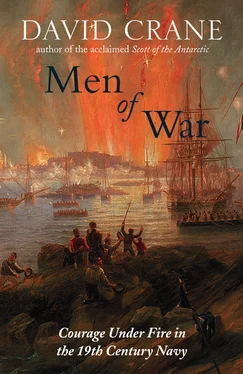There was often clearer weather close in to shore at Halifax, and with lookouts posted on the bowsprit-end and jib boom, a leadsman in the chains taking constant soundings, and her signal guns firing every quarter-hour, the Atalante nudged under easy sail into the thickening fog. For forty-five minutes Hickey coaxed her towards the safety of harbour, and with the guns of Sambro Island – as he still fondly imagined them – silent, and the leadsman reporting nothing at twenty fathoms, had just begun to think his ship clear of danger when there was a sudden warning cry of ‘Starboard the helm!’ and the Atalante was in breakers. In a matter of minutes ‘the rudder, the stern-post and part of the keel’ had been ripped away by the rocks of the Eastern Shelf off Sambro Island, Hickey reported at his court martial, ‘and perceiving immediately that there was no hope of saving the ship, my whole attention was turned to saving the lives of my valuable crew; to effect which, I directed, in the first place, the quarter boats to be lowered, and the jolly boat to be launched from the poop. I had also given directions for the guns to be thrown overboard; but the ship filled before any of them could be cut loose.’
There was just time to fire off a distress signal from the guns still above the water, and to order his men to the exposed larboard side of the ship, when with a crash of masts, the Atalante broke into three. ‘In twelve minutes she was literally torn to pieces,’ Jeremiah O’Sullivan, a passenger on board recalled, as the crew fought against the crashing breakers to get to the ship’s pinnace, tangled up helplessly in the wreck of the Atalante ’s booms, ‘… and to see so many poor souls struggling for life, some naked, others on spars, casks, or anything tenable was a scene painful beyond description.’
One of their boats had already gone down – not to mention Hastings’s sea chest with all his possessions and papers – and with some sixty of the crew struggling to get into the pinnace, it seemed only a matter of moments before most of them went the same way. It was rapidly obvious to Hickey that not all of them could possibly escape in her, and ordering twenty or thirty of them out onto the booms, he succeeded in freeing her from the wreckage and – ‘in a most miraculous manner’ – launching her to safety.
With the pinnace freed there was one last, desperate attempt to lash the booms into a makeshift raft, but almost immediately they began to drift into still heavier breakers. ‘I signalled to the small boats to come near us,’ Hickey continued his evidence,
and each to take in a few more men, distributing them with each other and the pinnace till I succeeded in getting every man and boy off the raft, when, with three cheers, the wreck was abandoned. After pulling near two hours without seeing the land, guided only by a small dial compass, which one of the quartermasters had in his pocket, we picked up a fisherman, who piloted the boat safe into Portuguese cove … It now becomes a pleasing task to me to state in the fullest manner that the conduct of my officers and ship’s company, under the most trying circumstances in which human beings could be placed, was orderly, obedient and respectful, to the last extremity.
The loss of the Atalante probably had as much to do with her seaworthiness as anything else, and if Hastings was lucky to get away with his life and reputation – Hickey and his officers were honourably acquitted of all blame at the court martial – it was an omen of things to come. For the first seven years of his naval career he had known nothing but success, but over these next two he was to see the other side of his profession and learn the lessons of defeat in a war that exposed inadequacies in the Royal Navy that twenty years of almost seamless triumph had successfully masked.
There were any number of issues that lay behind the War of 1812 – the right to search and impressment, republican sympathies, Yankee designs on British Canada, mutual dislike – but at the heart of the struggle lay the system of economic warfare between Napoleonic France and Britain that threatened American merchant interests. In 1806 Napoleon had promulgated the first of his decrees designed to cripple British trade, and when Britain retaliated with her own Orders in Council that effectively closed Continental ports to neutral shipping there were inevitably a thousand potential flashpoints for war. ‘With respect to America,’ Stewart had written prophetically to Sir Charles Hastings in 1808,
we may possibly by concessions put off the evil day but the arrogance, highhandedness & I may say ungentlemanlike conduct of that nation will sooner or later force us to quarrel with them; we have always put up with things from them we would not have suffered from any other nation in the world, many instances of which I saw in the last war, & our forbearance only increases the insolence of the mob, which seems to me the only real government in that country.
None of this can disguise what a ‘bad’ war the War of 1812 was, but to an ambitious young naval officer there is no such thing, and within weeks of the Atalante going down Hastings was lucky enough to join the newly commissioned Anaconda under the command of the twenty-eight-year-old George Westphal. There had been nothing wrong with Hickey – except that he seems to have been a permanently unlucky officer – but of all Frank’s captains George Westphal, a protégé of the Duke of Kent and scion of an aristocratic German family of Hastingsesque antiquity, was by some margin the most remarkable.
As a young midshipman at Trafalgar he had lain next to the dying Nelson in the cockpit of Victory , and that was just the first and most romantic of his battle honours. In 1807 he had again been severely wounded and was captured after a long and bloody action, but making his escape in an open boat from a Guadeloupe prison ship, had worked his way back to England – courtesy of an American merchantman and an English privateer – in time to join in the reduction of Martinique and to take a prominent and heroic part in the attack on Flushing.
Fleet actions, espionage, ship-to-ship, siege work, land skirmishes, Westphal had fought in over a hundred engagements in all, and had continued in the same vein on American soil. ‘On first landing,’ a contemporary biography recorded one typical incident,
Mr Westphal, having dismounted an American officer, set off on the captured horse in pursuit of the fugitives; forgetting, in the ardour of the moment, that it was not possible for his men to keep pace with him – a circumstance indeed that did not present itself to him until he found himself, unsupported, in the midst of a body of armed men. Firing his pistols right and left, however, and slashing his sword in all directions, he dashed through them and succeeded, although wounded by a shot through the hand, in effecting his escape, bearing away with him at the same time as his prisoner a Captain in the militia.
Hastings’s new posting was doubly fortunate for him, because it was not as if the navy’s performance against the Americans had been of a kind that would guarantee him a ship like the Anaconda , or a captain like George Westphal. For the previous decade the service had exercised a virtual mastery over its European enemies, but when in the first year of war English ships had taken on more heavily armed enemies with crews – as often as not British and Irish – of more or less equal skill, the result had been a series of defeats that became an equally fertile source of American myth-making and British soul-searching.
At the heart of the British performance – when all the socio-moral nonsense about Republican Virtue and New World Vigour is forgotten – were failures in long-range gunnery, and it was this that turned Hastings into the impassioned evangelist of gunnery reform he became. After twenty wearing years of warfare there were clearly other factors at work, but in a service in which ‘any knowledge … of gunnery [was] obtained gratuitously’, as Hastings – precursor to all those prophets of gunnery change who would cry in the naval wilderness over the next hundred years – contemptuously put it, ‘all the Seaman’s help in the world will avail little, if your artillery practice is inferior to the enemy’.
Читать дальше











